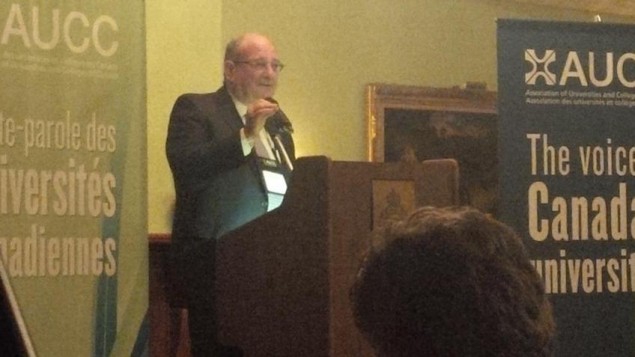For Paul Davidson, the head of an umbrella group of Canadian universities, seeing is believing when it comes to Israel.
“I was there in 2012 and visited all your universities,” Davidson told The Times of Israel. “I saw the many innovations in all areas of technology, and understood the phenomenal pressures you face, as well. It’s one thing to read the book ‘Start-Up Nation’ and another thing to actually see that incredible story in action.”
And Davidson, president and CEO of the Association of Universities and Colleges of Canada, is not going to allow the BDS movement to prevent his country’s 97 universities and colleges from building beneficial relationships with Israel.
“Boycotts are not a way to solve anything, and we strongly believe in developing and encouraging dialog to solve problems of all kinds. It’s for that reason we are holding a special conference this week to enhance that dialog, and allow institutions in both countries to develop better relationships,” Davidson said.
Davidson was referring to an international gathering of university and research leaders taking place in Ottawa this week to discuss national innovation systems and how they help universities drive the advancements that build prosperity. University presidents and innovation experts from Canada, Israel and Germany gathered for a policy dialogue called “Optimizing Canada’s Innovation system: Perspectives from Abroad.” About 100 academics – mostly university presidents from Canada, Israel, and Germany – took part in the event sponsored by the AUCC, which is an advocacy group that represents Canadian universities in the political and business spheres.
Because it’s such a large country and a neighbor of the US, people tend to think of Canada as more advanced technologically than it really is, said Davidson, but in truth, Canada has a few things to learn about developing technology and successfully deploying it in the country’s economy. That’s something that Germany, and especially Israel, have learned to do well. “Israel has a good tolerance for high risk, and that is an important factor in the development and success of its start-up infrastructure,” said Davidson. “We want to adopt some of Israel’s strategies here.”
One reason Israeli academic tech research is able to get out into the economy – both locally and internationally – is due to the diligent efforts of the university tech transfer companies in Israel, which develop university research into products and technologies that can be sold or licensed commercially. “Canadian universities have had some success with their tech transfer companies, but there are definitely lessons we can learn from Israel about how to integrate technology in the economy. Israel has been extremely successful at this, and innovations from Israel are helping people around the world.”
There’s a lot Israel can do to help out Canada. “Brain technology is an important area of research both here and in Israel, and we’d like to expand the cooperation and joint projects that are already going on in this area,” said Davidson. “Information and communications technology is another important area for us. And Israel has a lot of important water technology that can do a lot for Canada.”
Here, said Davidson, is another example of the “Canada myth” at work. “Most people are very surprised to hear that Canada has water issues, but there many Israeli water technologies that can help Canada such as in water purification, delivery, more effective use of resources, and others.”
And BDS is not going to stand in the way of the budding Israel-Canada tech relationship. “Like elsewhere, there is a BDS movement in Canada, stronger or weaker depending on the campus, political circumstances, and other factors,” said Davidson. “The American Studies Association last year rejected a boycott of Israel, saying that only dialog, and not closing doors, will solve problems, and we feel the same way. One of the advantages of a small forum like this week’s conference is that it encourages that dialog, especially among the top decision makers. This is the kind of dialog that will help us solve problems.”
Davidson maintained that many of the accusations made by BDS activists against Israel just aren’t accurate; Israel is a complicated place, and gleaning information about what goes on there from just the headlines – as many people in the West do – won’t provide a full picture of what is going on there. “Israel has developed some incredible technology that is helping people all over the world,” said Davidson. While not denying that there are burning political issues, “we have to keep in mind the difficult pressures and circumstances Israel faces.
“I don’t want to diminish the contention that the political situation in Israel has engendered in Canada – and in Israel, as well, where there are vigorous debates on the direction of the country,” added Davidson. “But academic debate is good too, and by enhancing our relationship with Israeli institutions, we can engage them on those issues – and work together to develop technology that will help everyone.”



